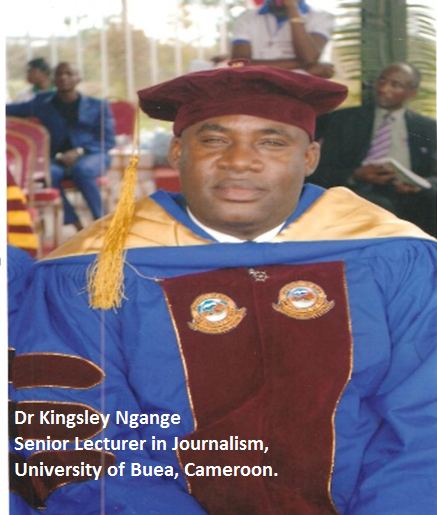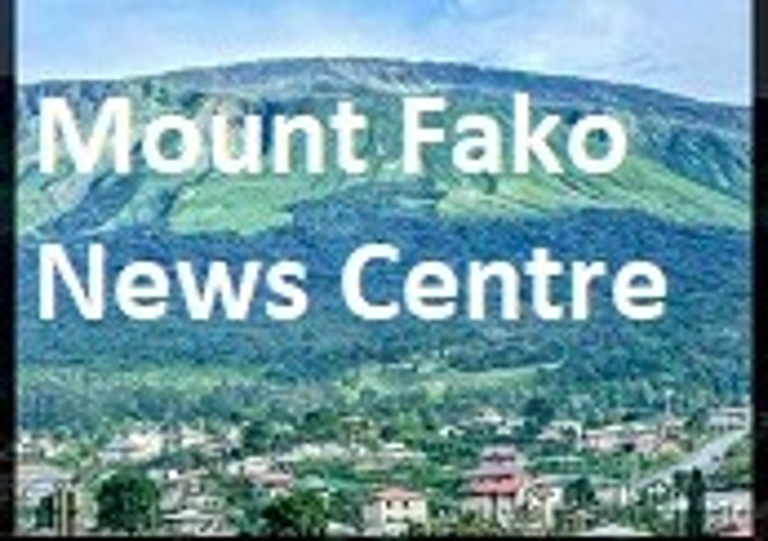FAKO LAND CRISIS: WHAT CRTV BUEA’S
PRESS CLUB DID NOT SAY (Part 1)
By Kingsley Lyonga-La-Ngange, Ph.D
Senior Lecturer in Journalism, University of Buea, 77 49 81 87, kngange@yahoo.com


I have followed, with keen interest, discussions in the last two editions of CRTV Buea’s most popular news programme—Press Club. The panel of venerated journalists and their guests brought to the table a subject—Land Grabbing in Fako-- hitherto referred to as taboo for public discussion. For this, I doff my hat to the brave hearts!
So far, they have x-rayed the problem from different angles: excessive grabbing of communal land by some senior administrators (non-natives) of the division and beyond; indiscriminate sale of ancestral land by some insatiable Fako chiefs and elites; the creation of fake new lay outs by corrupt administrators with the intention to acquire and eventually sell Fako communal land to non-natives; the sharing of land sale booty by an oligarchy; and the emergence of what Marxist theory call a bourgeoisie class.
We can push the discussion further by bringing to the table what the press “clubbers” have not yet touched on—the extinction of the indigenous Fako people. Extinction may mean different things to different people, such as death, extermination, destruction, loss, annihilation, disappearance, eradication and elimination. For clarity, I use the word here to mean the wiping out of Fako people. As unimaginable as this may seem, yet there are serious signs on the ground which indicate that it is just a matter of time.
One does not need a class room lecture, a pulpit sermon, a news room presentation or a presidential decree to believe that once a people lose their land and culture (way of life), then, extinction is inevitable. I will limit part one of this discussion to land.
Discussions on Press Club over CRTV Buea made startling revelations of how Fako people lost thousands of hectares of fertile land to the Germans over 100 years ago. Till date this land has not been recovered. The piecemeal charade or “surrender” of the land to the people is what has created the Fako land crisis, already mentioned above. What is even more disturbing is that the Fako people are rapidly losing ownership of the reserve land they were forced to occupy during the German invasion along the foot of Mount Fako. This point is buttressed with evidence from some villages like Dibanda, Bolifamba (Mile 16), Muea, Molyko, Bonduma, Great Soppo, Ekona Mbenge, Tole, Wotutu, Maumu, etc, which may soon not have a Bakweri chief or as it stands now, will have a Bakweri chief with only one or two natives as his subject.
One should not misinterpret the above for xenophobic advocacy-- far from that. On the contrary, the debate is on “live and let’s live” or better put “let’s live and live” since they own the land first. This means that the presence of overwhelming number of settlers in Fako, which is appreciated, should not be at the expense of the indigenous people and their culture. This can’t be. For instance, the few Fako natives lecturing in the University of Buea have continuously been targets of elimination (by orthodox and unorthodox means). If Fako people cannot work and feel at home in Fako Division where else can they? Yesterday it was Fako lecturers in UB, today it is their beloved chiefs called “potters/carriers”, who will be next—their politicians? Thus, the overt attempts to heterogenise Fako through machinations in the land surrender process not only facilitate the people’s extinction but weaken their economic and political positions as important stakeholders on national issues. This was exactly the agenda of the colonizing Germans in Kamerun, and the annihilation strategy used by Caucasian settlers in North America on the native Indians.
Prof. Ndive Kofele Kale, a Fako intellectual, predicts a bleak future if nothing is done and fast too. In fact, during the 16th Annual Fako America Convention in Dallas, Texas on June 26, 2010, Dr. Samuel Ewusi Kale (another Kale) said the “Fako nation is buffeted by strong cross winds both at home and abroad that makes it especially difficult to foresee where we will be tomorrow.” Hence, the perpetuation of corruption in the CDC land surrender process is inherent in a Balkanization agenda on Fako land, overtly or covertly, through senior administrators’ divide and rule, the colonization of SONARA and its assets for that enterprise to remain alien to Fako natives, and the transfer of native lands to more than 90% of non-natives. Land surrender has the potential to uplift the economic worth of the natives, but malpractices inherent in the surrender are a disservice to the mission of the process. // TO BE CONTINUED
